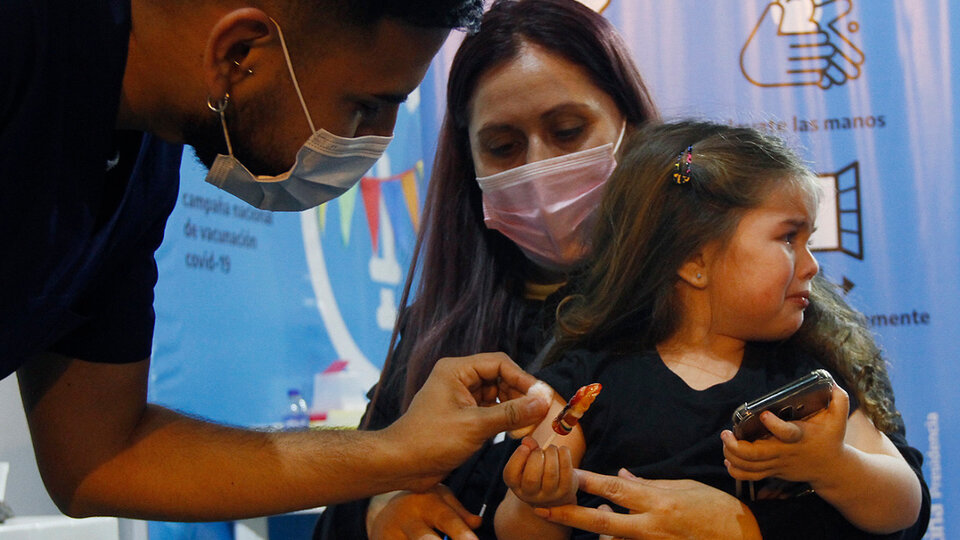To the doctor Gladys FerruciHead of the Zubizarreta Hospital vaccination center, she was “sorry” to see, in March, how “very important” vaccines of the National Calendar for boys were expired. It is a specific scene that depicts a trend that has been coming for some years and that the pandemic accentuated. With the covid taking all the leading role, society is postponing immunization with the other 20 vaccines on the Calendar. The sources consulted by Page 12 agree that measles is the greatest risk.
“It has been more or less five, six years since it has been in decline coverage, especially in young children under one year of age, school entry, adolescents and pregnant people. With the confinement they fell drastically. And this year, when there was no confinement, the coverage could not be fully recovered“, synthesizes the coordinator of the Program for the Control of Preventable Diseases by Vaccines of the Buenos Aires Ministry of Health, Alejandra Gaiano.
Florence Bruggesser, infectologist, member of the Argentine Society of Vaccination and Epidemiology (SAVE) believes that this is a “worrying” issue. “Argentina has one of the most complete calendars, it covers many diseases and thanks to this it has been possible to eliminate some and control others. Polio, measles, rubella have been eliminated. Hepatitis A has been controlled. A new one has been started. strategy in 2005 and thanks to this we stopped having fulminant hepatitis in children and transplants due to this pathology. Whooping cough was the cause of many outbreaks at other times. With various strategies it was possible to reduce mortality in children under six months and pregnant women. There are many examples of the importance of vaccination. There were many achievements and it is important to maintain them“, he stresses. Together with other entities, SAVE prepared in October a document with possible strategies in pursuit of this objective.
The measles alarm
The phenomenon is worldwide. In July the WHO y UNICEF indicated that in 2020 23 million children had not received basic vaccines (3.7 million more than in 2019). Tedros Adhanom Ghebreyesus, director general of the WHO, warned about the danger for children of contracting “devastating but preventable diseases”: measles, polio, meningitis. “The pandemic and related shocks have lost us valuable ground, and the consequences will be paid in the lives and well-being of the most vulnerable, something that we cannot afford, “said Henrietta Fore, UNICEF Executive Director at the time.
In the country, this panorama returns the reemergence of some diseases. There are cases of whooping cough and of meningitis por haemophilus influenzae B. Most alarming is the measles threat. “We do not have cases, but we have very low coverage. Brazil has a tremendous outbreak. It is something that we are working hard on, improving the surveillance capacity of laboratories and the diagnosis of doctors. As it is an eliminated disease, many pediatricians did not see it. in 20 years, then they do not suspect it, it occurs many times with few symptoms. The lack of suspicion, the opening of borders and low coverage mean that we are at very serious risk“warns Gaiano.
“In children under one year old, measles is much more deadly than Covid and much more contagious. One case can infect between 12 and 16 people. It is important that all adults have two doses,” he adds. Since 2000 there have been no autochthonous cases. The last outbreak was between 2018 and 2019. “In general, the entry into the country occurs by adults who travel and are not vaccinated and infect children, especially the most socioeconomically vulnerable.”
Bruggesser argues that what has been learned about the new coronavirus variants applies to measles, “one of the most communicable diseases”, since it is “suspended in the environment for up to two hours” and is contagious “even without having been in contact with person”.
Report of the Ministry of Health
The Ministry of Health of the Nation recently presented a report that indicates progressive declines between 2009 and 2019 in the vaccination of newborns, infants and children of one year of life that are between 12 and 15 points. The same is seen with the vaccination coverage of school entry: they fell 15 points between 2009 and 2019. In the period there were improvements in the cases of adolescents and pregnant women, but the growth in the former stopped in 2019 and in the latter it is seen a decreasing trend from 2018.
The decline continued in 2020, most notably in the boys entering school and adolescents. The percentage reduction is global and the greatest impact is in March and October 2020. The average decline compared to 2019 is 10 points. Last year no vaccine on the schedule in any age group exceeded 80 percent coverage nationally.
“This negative impact has been general, for all CNV vaccines simultaneously and could be due to the confinement situation, the readjustment that vaccination services must have undergone in their activities in the context of the onset of the pandemic, a decrease in the demand of the population for vaccines, access barriers secondary to limitations in mobility and / or access to public transport, and the fear that it could generate in individuals – generally healthy – attending vaccination services and contract Covid-19, “the document suggests.
“What I see is that parents think nothing more than the covid vaccine for children, leaving aside the Calendar. Or their vaccinations are late. The boys took a long time to come. Classes opened later. There were also parents who perhaps thought it was dangerous to bring the boy. Now the coverage has slowly increased, “says Ferruci.” We have gone to schools in the area with nurses and with that we have improved a lot, I am not saying much, the school entrance and 11-year vaccines, “he says.
For the doctor, it is necessary “strengthen the arrival of information”. “From the National State there will be a reinforcement in advertising, with a campaign, more or less in the middle of this month. And another type of management will be arranged with shifts. We have to see what the covid has taught us. Our vaccination program is within a green area. There are no infected people, it is not a guard, no people accumulate “, he completes, to make it clear that vaccination centers are safe spaces.
Strategies for changing the numbers
Gaiano details that in the province of Buenos Aires the coverage is 80 percent in triple viral (measles, rubella, mumps) and 79 in school entry. The goal is far: 95 percent. In the middle of the year the scenario seemed even less favorable; the numbers rose in part as a result of the Vaccination Week, with strategies that were replicated in the 135 municipalities of the province. It was in October.
“They were intensive actions and he recovered a lot. Each municipality generated its strategic plan. Brochures were made, they went out to vaccinate schools, squares, clubs, house by house. The priority at that time were boys and girls under six years of age, adolescents and pregnant women “, describes the official. Got vaccinated 24 thousand people. “Vaccination hours were extended, there were gazebos at the covid vaccination posts with the Calendar vaccines, the school cards were reviewed,” he completes. But “a week is not enough to reverse the figures.” The action was a trigger for other movements, such as refresher courses for vaccinators.
In the same month, the Ministry of Health of the Nation and UNICEF faced the campaign Vaccine Action, aimed at those who had difficulties in accessing information to encourage them to complete their scheme. In the networks, through a game of questions and answers about the history, myths and realities about vaccines, it was sought to sensitize families, those responsible and caregivers of girls, boys, adolescents and people with risk factors and offer data on the which are compulsory and free and the places where they could be found.
Causes
“Ours is a pioneer country. We have a very good schedule, with many vaccinations. Many people trusted the program a lot. We had good coverage. There were very few vaccine groups“, says Gaiano. The phenomenon for which coverage has decreased is multi-causal. “The pandemic, the confinement … also the economic crisis prior to the pandemic, which made people have difficulties of access. Now the perception of risks with respect to diseases preventable by vaccines has gone down. They prefer to wait: they do not see it important In some cases, parents prefer not to vaccinate with the vaccines on the calendar. They are afraid that everything together (due to the covid) will harm the children “, analyzes the official. To these reasons, Bruggesser adds the strict isolations in some jurisdictions and the overload of health personnel in tasks related to the covid.
The anti-vaccine movement also played a role. “When mistrust is generated, or slogans against a vaccine, many times what happens is that it spreads to other vaccines or the vaccination program,” says Gaiano. Bruggesser adds: “Argentina does not have important anti-vaccine populations, but obviously in recent years we have had some more important groups that have decreased coverage. Anyway, it is not the big problem. We have to see what are the conditions that make us lose vaccination opportunities. Perhaps it is the overload of the health system; also the accessibility of the people “.
The recommendation of the sources consulted for this note is unanimous. “That people come to get vaccinated. Vaccinations are safe places. Let the whole family go. Let them take their notebook. If they do not have ID or book they can be vaccinated the same. They need absolutely nothing. It is a universal right. The public health strategies that have saved the most lives in human history are drinking water and vaccines, “concludes Gaiano.” The message has to be that vaccines are very important. They have managed to get us to control many diseases and have them eliminated at this time, “Bruggesser says.
– .


